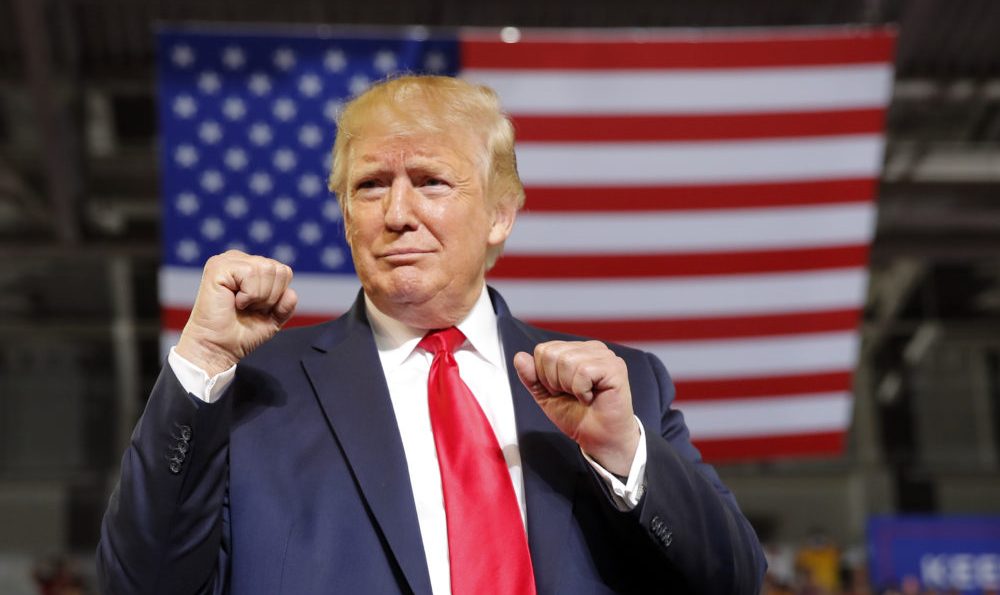Trump Pledges Crypto Leadership for the U.S. Amid Bitcoin’s $100K Surge
12.12.2024 17:54 1 min. read Kosta Gushterov
During a recent appearance at the New York Stock Exchange, President-elect Donald Trump expressed his ambition for the United States to take the lead in the global cryptocurrency space during his upcoming term.
His remarks signal a potential shift in the nation’s approach to digital assets.
Speaking with CNBC’s Jim Cramer, Trump emphasized the need for America to stay ahead in the cryptocurrency race, referencing competition from nations like China. He hinted at exploring strategies to strengthen the U.S.’s position, including the possibility of creating a national Bitcoin reserve. “We want to be at the forefront, not playing catch-up,” he said.
BREAKING: 🇺🇸 President-elect Donald Trump says, “Will be doing something great with crypto.”
pic.twitter.com/47TFh8j7NM— Bitcoin Magazine (@BitcoinMagazine) December 12, 2024
This marks a significant departure from the policies of the outgoing administration, which often clashed with the cryptocurrency sector. Trump’s comments align with promises made during his campaign to support the burgeoning digital asset industry, a move that resonated with voters and industry leaders alike.
The visit to the NYSE, where Trump rang the opening bell in celebration of his recent recognition as Time magazine’s “Person of the Year,” coincided with Bitcoin maintaining its historic position above the $100,000 mark—a milestone it reached last week, capturing global attention.
-
1
SoFi Returns to Crypto with Trading, Staking, and Blockchain Transfers
27.06.2025 8:00 1 min. read -
2
GENIUS Act Could Reshape Legal Battle over TerraUSD and LUNA Tokens
30.06.2025 9:00 1 min. read -
3
Whales Buy the Dip as Retail Panics: This Week in Crypto
29.06.2025 14:00 3 min. read -
4
History Shows War Panic Selling Hurts Crypto Traders
28.06.2025 18:30 3 min. read -
5
Ripple Faces Legal Setback as Court Rejects Bid to Ease Penalties
26.06.2025 16:54 1 min. read
How to Earn Yield Holding USDC: A 2025 Guide
If you’re holding USDC and want to maximize your yield, Deribit now offers rewards for eligible users who store USDC on its platform.
Kazakhstan May Invest Gold Reserves in Crypto Sector
Kazakhstan is considering allocating a portion of its gold and foreign currency reserves, along with National Fund assets, into crypto-related investments.
Grayscale Confidentially Files for New SEC-registered Offering Amid Growing Crypto Market demand
Grayscale Investments announced today that it has confidentially submitted a draft registration statement on Form S-1 to the U.S.
Here is How to Read the Crypto Fear and Greed Index
In the volatile world of cryptocurrency, investor psychology is one of the most powerful forces behind price movement.
-
1
SoFi Returns to Crypto with Trading, Staking, and Blockchain Transfers
27.06.2025 8:00 1 min. read -
2
GENIUS Act Could Reshape Legal Battle over TerraUSD and LUNA Tokens
30.06.2025 9:00 1 min. read -
3
Whales Buy the Dip as Retail Panics: This Week in Crypto
29.06.2025 14:00 3 min. read -
4
History Shows War Panic Selling Hurts Crypto Traders
28.06.2025 18:30 3 min. read -
5
Ripple Faces Legal Setback as Court Rejects Bid to Ease Penalties
26.06.2025 16:54 1 min. read

